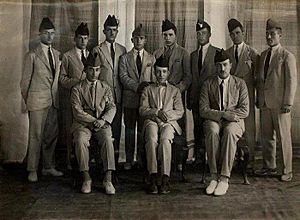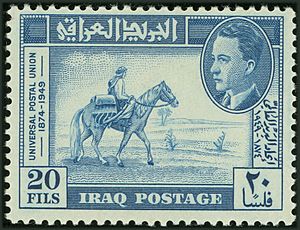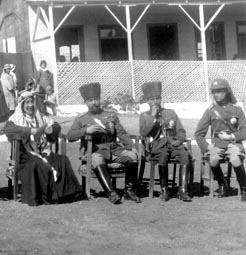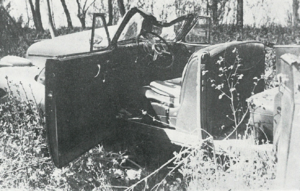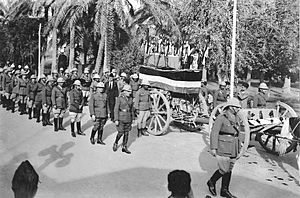Ghazi of Iraq facts for kids
Quick facts for kids Ghazi I |
|||||
|---|---|---|---|---|---|
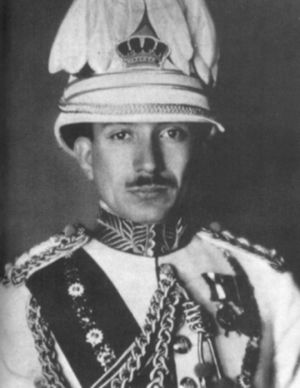 |
|||||
| King of Iraq | |||||
| Reign | 8 September 1933 – 4 April 1939 | ||||
| Predecessor | Faisal I | ||||
| Successor | Faisal II | ||||
| Born | 21 March 1912 Makkah, Hejaz, Ottoman Empire |
||||
| Died | 4 April 1939 (aged 27) Baghdad, Kingdom of Iraq |
||||
| Burial | Royal Mausoleum, Adhamiyah | ||||
| Spouse | Princess Aliya bint Ali | ||||
| Issue | Faisal II | ||||
|
|||||
| House | Hashemite | ||||
| Dynasty | Hashemites of Iraq | ||||
| Father | Faisal I | ||||
| Mother | Huzaima bint Nasser | ||||
| Religion | Sunni Islam | ||||
Ghazi ibn Faisal (Arabic: غازي ابن فيصل) was the King of Iraq from 1933 to 1939. He was born on March 21, 1912, in Mecca. Ghazi was the only son of Faisal I, who became the first King of Iraq. Before becoming king, Ghazi was briefly the Crown Prince of the Arab Kingdom of Syria in 1920.
Contents
Early Life of King Ghazi
Ghazi was the only son of King Faisal I and Huzaima bint Nasser. He was born while his father was fighting in the 'Asir region. Because of this, he was named Ghazi, which means "warrior."
As a young child, Ghazi stayed with his grandfather, Hussein bin Ali. Hussein was the leader of the Hashemite family and the Grand Sharif of Mecca. Ghazi's father was often away on travels and military campaigns. The Hashemites had ruled the Hejaz region, which was part of the Ottoman Empire. They later rebelled against the Ottomans with help from the British during World War I. Ghazi also attended Harrow School in England.
Unlike his father, Ghazi was a shy and less experienced young man. In 1924, his grandfather's army was defeated by Saudi forces. This meant Ghazi and the Hashemite family had to leave Hijaz. They moved to Transjordan, where Ghazi's uncle, Abdullah, was king.
In the same year, Ghazi joined his father in Baghdad. He was then named crown prince and the future leader of Iraq. His father had become king after a national vote in 1921.
Ghazi's First Flight: The Flying Carpet
When Ghazi was 16 and still a schoolboy, he met two famous adventurers. They were Richard Halliburton, a traveler, and his pilot, Moye Stephens. They were flying around the world in their biplane, called the Flying Carpet. This was soon after Charles Lindbergh's famous flight across the Atlantic Ocean.
Halliburton and Stephens took Ghazi on his very first airplane ride. They flew over the ancient ruins of Babylon and other historic places. They even flew low over Ghazi's school so his friends could see him in the plane! You can read about this exciting flight in Richard Halliburton's book, The Flying Carpet.
Involvement in the Simele Events
In 1933, Ghazi visited Simele. He was there to honor military and tribal leaders. These leaders had been involved in events on August 11, 1933, which included attacks on Assyrian communities and the looting of their homes.
King of Iraq: Ghazi's Reign
On September 8, 1933, King Faisal I passed away. Ghazi then became King Ghazi I of Iraq. On the same day, he was given high military ranks. He became Admiral of the Fleet in the Royal Iraqi Navy. He also became Field Marshal of the Royal Iraqi Army and Marshal of the Royal Iraqi Air Force.
King Ghazi was a strong supporter of Pan-Arabism. This idea aimed to unite Arab countries. He was also against British influence in Iraq. His time as king saw disagreements between civilian leaders and the army. The army wanted more control over the government.
Ghazi supported General Bakr Sidqi in a coup d'état. A coup is when the military takes control of the government by force. This coup replaced the civilian government with a military one. It was the first time such an event happened in the modern Arab world.
There were rumors that King Ghazi had some sympathy for Nazi Germany. He also claimed that Kuwait should become part of Iraq. To spread his ideas, he had his own radio station at the royal palace. From there, he promoted his views, including the claim on Kuwait.
Family Life
On January 25, 1934, King Ghazi married his cousin, Princess Aliya bint Ali. She was the daughter of his uncle, King Ali of Hejaz. They were married in Baghdad, Iraq.
They had one son, Faisal II, who was born on May 2, 1935.
Death of King Ghazi
King Ghazi died in April 1939. He was in an accident while driving his sports car. Some people in Iraq believed he was killed on purpose. They thought Nuri al-Said, a powerful politician, ordered his death. This was because Ghazi wanted to unite Iraq with Kuwait.
Ghazi's only son, Faisal, became King Faisal II. Since Faisal was still a child, his uncle, Prince Abdul Ilah, acted as regent. A regent is someone who rules for a king or queen who is too young. Prince Abdul Ilah served as regent until 1953.
See also
 In Spanish: Gazi I de Irak para niños
In Spanish: Gazi I de Irak para niños
- British Mandate of Mesopotamia
- List of unsolved deaths
- Saib Shawkat
 | Sharif Bey |
 | Hale Woodruff |
 | Richmond Barthé |
 | Purvis Young |


